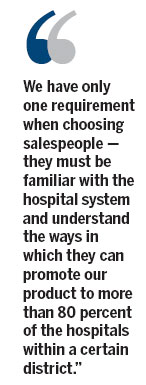Li Tao, 60, a physician at a public hospital in Northeast China's Jilin province.
As far as I know, almost all the doctors prescribe drugs provided by sales reps on condition they receive a large kickback.
In addition, many doctors in outpatient departments prescribe "high-kickback" drugs, which account for most of the medicines used in hospitals.
Generally, departmental directors and vice-directors get most of the bribes, but the other doctors and nurses also receive something every month. The money is distributed on a sliding scale in order of their importance.
If it's a special day for a director or senior practitioner, the sales representatives are usually the first to congratulate them by sending "greetings", such as store cards or gifts. Sometimes they invite the entire department to dinner or to spend a weekend at a fancy entertainment venue.
Compared with drug kickbacks, red envelopes (a form of petty bribery in China) usually only contain small amounts of money and are easily traceable.
However, most of the doctors in my hospital refuse red envelopes, and their "gray income" comes mainly from kickbacks instead.
Experienced sales representatives don't usually visit hospitals, but if they do they never talk about medicine and kickbacks. They send gifts directly to people's homes.
Sales representatives are also familiar with the close family members of the doctors and use them as conduits for gifts and cash.
Very few bribes come in the form of hard cash. Instead, they are usually transferred to unmarked bank accounts.
We mainly prescribe domestic drugs. Foreign medicines only account for a small proportion of the total because they are comparatively expensive and aren't available through medical insurance, so few patients agree to use them.
Li Tao spoke to He Na and Han Junhong.
Zhang Shuang, sales manager at a large pharmaceutical enterprise in Changchun, Jilin province
My company doesn't employ full-time sales reps. Instead we only use freelance salespeople and their relationship with us is limited to quarterly visits, when they come to get their own kickbacks.

We only have one requirement when choosing salespeople - they must be familiar with the hospital system and understand the ways in which they can promote our products to more than 80 percent of the hospitals within a certain district.
Cutthroat competition will only lead to a lose-lose situation, so to prevent a full-scale price war, we usually only assign one leading representative to each district. Their performance is assessed on a quarterly or semiannual basis and they are replaced if they fail to meet the required sales volume over two consecutive assessment periods.
People with a close relationship with government staff or who are relatives of high-fliers in the medical system are our preferred choices of reps.
Out of all the drugs and related equipment we produce, the sales reps only choose those with wide profit margins because it encourages hospitals and doctors to put in orders.
Take cannulas - the reedlike pipes that allow fluids to be injected into or drained from the body - for example. Our factory price is 16.8 yuan ($2.75) each, but the reps sell them at 24.45 yuan apiece, while the hospital price is 50.45 yuan.
Zhang Shuang spoke to He Na and Han Junhong.
|
|
|
|
|
|
|
|
